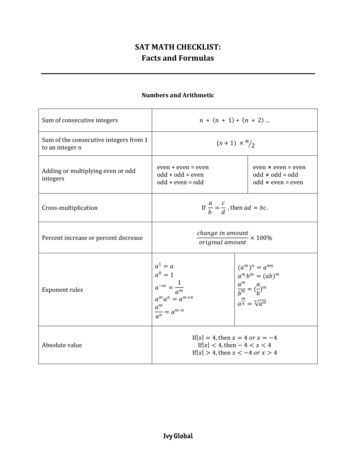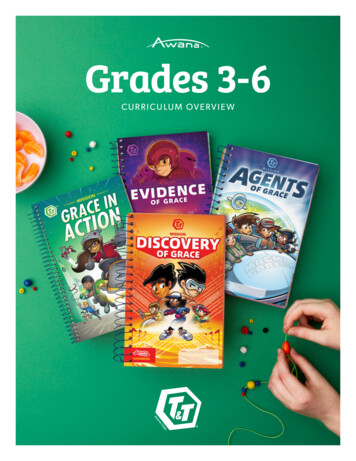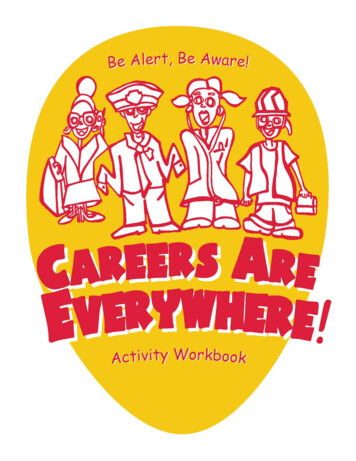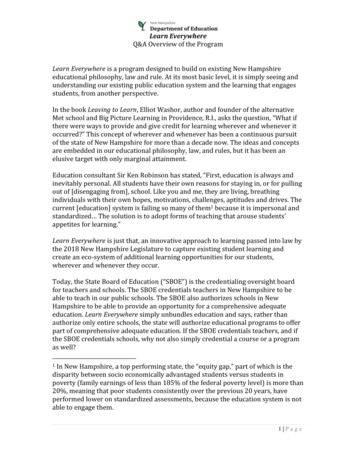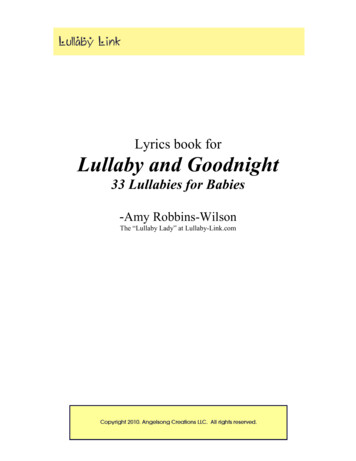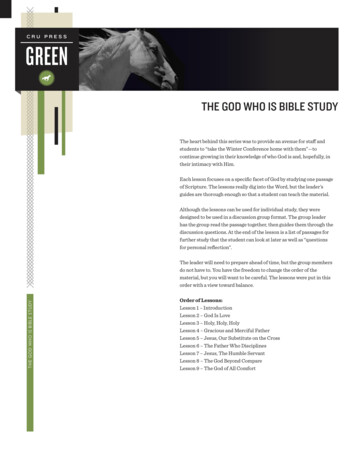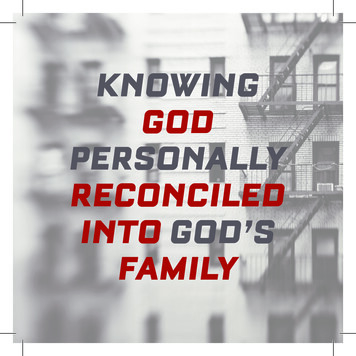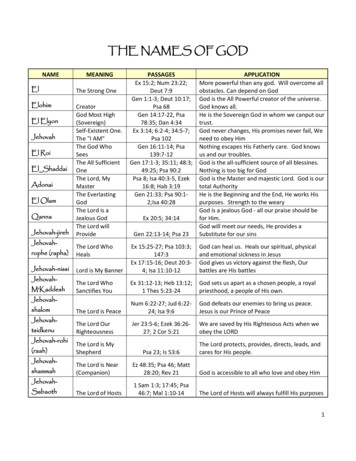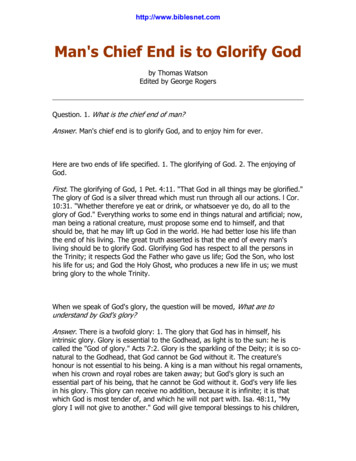
Transcription
"God is Everywhere - Even inNursery Rhymes!" can beenjoyed by children for therhymes themselves, and byadults, by reading thecommentaries after eachrhyme that demonstrate howGod is in the rhymes.God is Everywhere – Even InNursery Rhymes!by James F. MalerbaOrder the complete book from the publisher 0915.html?s pdfor from your favorite neighborhoodor online bookstore.
Copyright 2020 James F. MalerbaISBN: 978-1-64718-326-4All rights reserved. No part of this publication may be reproduced,stored in a retrieval system, or transmitted in any form or by any means,electronic, mechanical, recording or otherwise, without the prior writtenpermission of the author.Published by BookLocker.com, Inc., St. Petersburg, Florida.Printed on acid-free paper.BookLocker.com, Inc.2020First Edition
Table of ContentsIntroduction . 1The (Generous) Black Sheep . 4Hot Cross Buns (for “Hot” Spirituality) . 6Humpty Dumpty (Lacking Faith?) . 9Ring Around the Rosie (Rosary?). 12One Potato, Two Potato (if You Can Eat Two!) . 15Sippity Sup (What Is Up?). 18Little (and Very Wise) Cock Sparrow . 20Butterfly, Butterfly (Flitter and Flutter) . 23The Lion and the Unicorn (the Horned and the Unhorned) . 26Rain on the Green Grass (Not on a Parade) . 30Itsy Bitsy Spider (Small, but Big in Faith) . 32Little Miss Muffet (the Track Star). 34Three Blind Mice (not Umpires!) . 36Speaking of Mice (Mouses?) Tommy Tittlemouse . 40Mary Had a Little (Loyal) Lamb . 43Birds of a Feather (Avian and Human) . 45Two Little Dicky Birds (More Than Feathers!) . 47The King of France Went Up the Hill (but Not for Water) . 50The Queen of Hearts (a Real Card!) . 52Girls and Boys Come Out to Play (in God’s Grace) . 54Polly Flinders (Typical Kid!). 57Rock-a-Bye Baby (a Baby in a Tree?!) . 60vii
God is Everywhere – Even in Nursery Rhymes!The (Not Forbidden) Apple Tree . 63(Speaking of Green, We Have ) Up in the Green Orchard. 65Five Little Ducks (Losing Their Way) . 67The Animal Fair (Nothing to Sneeze at!) . 70Monday’s Child (and a Week of Children) . 72Sing a Song of (at least!) Sixpence . 75For Want of a Nail (a Horse Tale? No – Much More!). 78Three Little (and Careless) Kittens . 80The Wheels on the Bus (to Heaven) . 82Old Mother Hubbard (and No Bones About It) . 84Six Little (Wise) Mice . 86Five Fat (and Tempting) Sausages . 88There Was an Old Woman Who Lived in a (Huge) Shoe . 90Come to the Window (and See God) . 92Rub-a-Dub-Dub (in a Big Tub) . 95Someone Came Knocking (Let Jesus In!) . 97Cross Patch (Angry and Gossipy) . 99Falling Leaves (God’s Grace) . 101The North Wind Doth Blow (Brrr!) . 103Baby Dolly (Aren't They All Dollies?) . 105Babies (All God's Specials) . 107Bye, Baby Bunting (Daddy Loves You) . 109Sleep, Baby, Sleep (Please Don’t Wake Us!) . 111I Had a Little (Soon to Be Abused) Pony . 113The Cock Crows (but to Make Us Wealthy?) . 115Little Boy Blue (in Clothes, not Mood!) . 117Dame Trot (She Didn’t!) . 119viii
Discovering the Depth of the Lord’s Presence in Even the Simplest Words(Vengeful?) Goosey, Goosey, Gander .122Oranges and Lemons (Don’t Compute) .124Little Jack Horner (a Young Believer) .127Twinkle, Twinkle Little Star (Our Wonderment) .129Starlight, Star Bright (Please Shine On Me) .131There Were Ten In the Bed (Some Bed!) .133Good Night, Sleep Tight (God Watches Over Us) .135If All the Seas Were One Sea .137A final Word .139Lists for Reference (Ashes and Blindness) .140ix
3
God is Everywhere – Even in Nursery Rhymes!The (Generous) Black SheepWe all know that rhyme; but what meaning lies beneath the surface?Symbolically, the black sheep is usually a family member or someoneelse who is being ignored or treated badly because of something he orshe has done, or is not welcome for some other reason. This is theperson you would not invite to your next party.This nursery rhyme, however, gives virtually hero status to the blacksheep. The other sheep are not asked for their wool, yet the black sheepeagerly shares his wool with three others. There is more than oneinterpretation to show Divine Presence. First, the number three – for thenumber of people getting the wool – can represent God (the Master) thedame (the Blessed Mother), and Jesus (the little boy). Also, the woolcan represent God’s gifts to all – men, women and children. Three bagsfull would be a lot culled from one sheep, black or otherwise, indictingan unending source of God’s love and grace for all.So, why a sheep at all? Sheep are the gentlest of all animals, trustingand obedient to their human masters. Jesus often used sheep as ametaphor in his preaching. In Matthew (9:36), Jesus pitied the peoplefollowing him, because they seemed to be spiritually lost – sheepwithout a shepherd.Also in Matthew (15:24), when the Canaanite woman begged Jesus toheal her daughter, he told her he was on a mission to serve just the lostsheep of Israel. Of course, Jesus was not cruel and he granted the4
Discovering the Depth of the Lord’s Presence in Even the Simplest Wordswoman’s wish after testing her faith. This was a lesson for the disciples,who had tried to shoo the woman away.Jesus used yet another metaphor when he referred to himself as theGood Shepherd (John 10:11). We are all “sheep” and must follow theGood Shepherd into eternal life by our obedience to Him.5
Hot Cross Buns (for “Hot” Spirituality)6
Discovering the Depth of the Lord’s Presence in Even the Simplest WordsHot cross buns, sold mostly during the Christian season of Lent,supposedly had their origin in the year 1361. Brother Thomas Rodcliffeof St. Alban’s Abbey in Herrtfordshire, England, is said to havedeveloped the recipe for “the Aban Bun”, which he gave to the poor onGood Friday.In 1733, the Oxford English Dictionary referenced hot cross buns andalso described them in a way that sounded like a now-familiar rhyme:“Good Friday comes this month, the old woman runs, with one or two apenny hot cross buns” (from online sources).In the Old Testament, There are references, not to hot cross buns, but totheir predecessors (raisin cakes). One is found in 1 Samuel (25:9-39).When David sent messengers to honor Nabal, a wealthy but nasty man,and let him know he and his men came to them in peace and in need ofsustenance, Nabal screamed at them, rather than welcome thedelegation.Totally abashed, Nabal’s wife, Abigail, hastily prepared two hundredloaves of bread (She must had had a huge oven!), wine, dressed sheep,roasted grain, and made two hundred cakes in which there were raisins(figs, in some translations) to feed David and his men. David blessedAbigail for her great generosity, but Nabal did not fare so well. After adrunken night, he fell ill and died ten days later.Another instance in which raisins had deep meaning is in 2 Samuel (6:119). David had just returned the Ark of the Lord to Jerusalem. In7
God is Everywhere – Even in Nursery Rhymes!celebration, he gave all his people food, including for each a raisin cake.No one was to go hungry, for David left no one without sustenance.David’s generosity has a parallel to the Eucharist, albeit indirectly.When Jesus fed the five thousand (probably at least triple that, with theuncounted women and children), with just five loaves of bread and twofish, the entire mass of people ate their fill that day (Matthew 14:13-21).The Lord was sending a message to the disciples, especially, thatsatisfying the physical hunger would lead to something far moreimportant – satisfying everyone’s spiritual hunger, which He revealed atthe Last Supper, instituting the Eucharist.8
Humpty Dumpty (Lacking Faith?)9
God is Everywhere – Even in Nursery Rhymes!One question we might ask ourselves is whether Humpty Dumpty wasthe clumsiest “person” on Earth. Most likely, Humpty the egg – as he isusually depicted – fell asleep while sitting on the wall or was distracted,causing himself to fall. Either way, it would not have taken much toshatter him.The fall, however then led to the concerted efforts of royal lineage to tryto fix the poor oaf. Who were those who came to the aid of thisunfortunate creature? The king’s horses? Really? Not likely that horseswould be proficient or have even a rudimentary knowledge of egg repair(if there were even such a thing).More likely, they would trample on poor Humpty, shattering him intoeven tinier pieces. The king’s men, however, convey a strongersignificance for us, for they can be seen as the clergy, who worktirelessly to not only enhance their parishioners’ faith, but also to“repair” fallen-away souls and bring them back to God.Perhaps Humpty chose the wrong path and was comfortable with hisdecision. His shattering was thus not a physical one, but rather of thespirit. So, the fateful fall Humpty Dumpty experienced can include allpeople who have suffered an abandoning of faith.However, spirituality and love of God can always put a person(including Humpty Dumpty) back together again through atonement anda return to faith practices. God is there for us to love him.10
Discovering the Depth of the Lord’s Presence in Even the Simplest WordsAll sinners can be saved for the Kingdom by expressing sorrow for allour sins, even in their last hours or moments of life. God, after all, ismost forgiving. No more dramatic proof of this is Jesus promisingParadise to the “Good Thief” as he and the Lord hung on crosses (Luke23:43). Where there is life, there is always hope.11
"God is Everywhere - Even inNursery Rhymes!" can beenjoyed by children for therhymes themselves, and byadults, by reading thecommentaries after eachrhyme that demonstrate howGod is in the rhymes.God is Everywhere – Even InNursery Rhymes!by James F. MalerbaOrder the complete book from the publisher 0915.html?s pdfor from your favorite neighborhoodor online bookstore.
spirit. So, the fateful fall Humpty Dumpty experienced can include all people who have suffered an abandoning of faith. However, spirituality and love of God can always put a person (including Humpty Dumpty) back together again through atonement and a re
